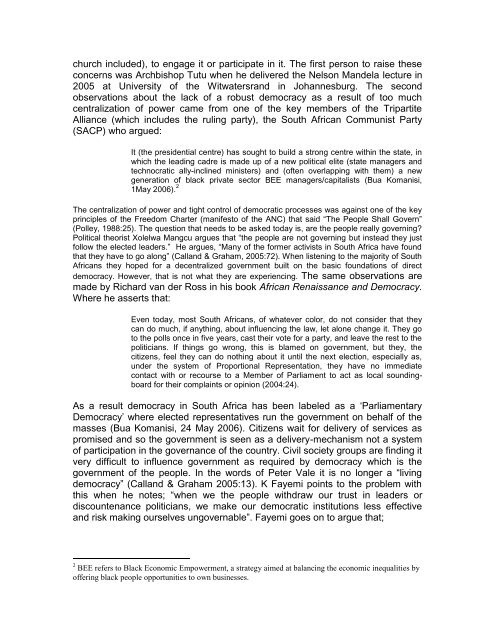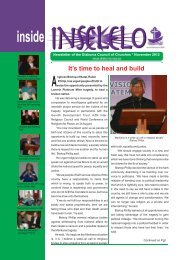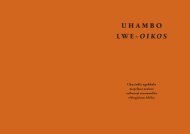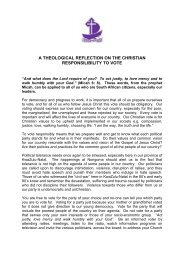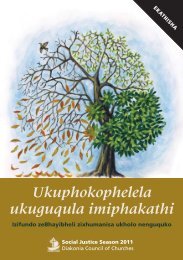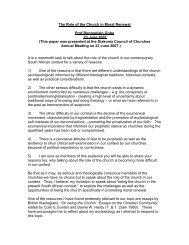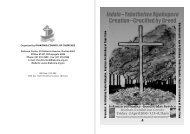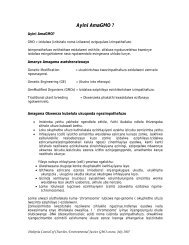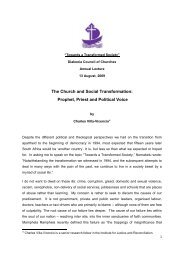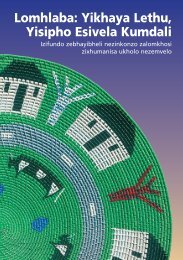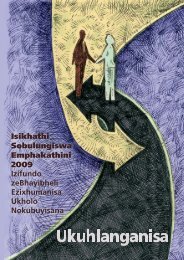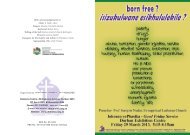a prophetic church in the democratization of the south african society
a prophetic church in the democratization of the south african society
a prophetic church in the democratization of the south african society
Create successful ePaper yourself
Turn your PDF publications into a flip-book with our unique Google optimized e-Paper software.
<strong>church</strong> <strong>in</strong>cluded), to engage it or participate <strong>in</strong> it. The first person to raise <strong>the</strong>se<br />
concerns was Archbishop Tutu when he delivered <strong>the</strong> Nelson Mandela lecture <strong>in</strong><br />
2005 at University <strong>of</strong> <strong>the</strong> Witwatersrand <strong>in</strong> Johannesburg. The second<br />
observations about <strong>the</strong> lack <strong>of</strong> a robust democracy as a result <strong>of</strong> too much<br />
centralization <strong>of</strong> power came from one <strong>of</strong> <strong>the</strong> key members <strong>of</strong> <strong>the</strong> Tripartite<br />
Alliance (which <strong>in</strong>cludes <strong>the</strong> rul<strong>in</strong>g party), <strong>the</strong> South African Communist Party<br />
(SACP) who argued:<br />
It (<strong>the</strong> presidential centre) has sought to build a strong centre with<strong>in</strong> <strong>the</strong> state, <strong>in</strong><br />
which <strong>the</strong> lead<strong>in</strong>g cadre is made up <strong>of</strong> a new political elite (state managers and<br />
technocratic ally-<strong>in</strong>cl<strong>in</strong>ed m<strong>in</strong>isters) and (<strong>of</strong>ten overlapp<strong>in</strong>g with <strong>the</strong>m) a new<br />
generation <strong>of</strong> black private sector BEE managers/capitalists (Bua Komanisi,<br />
1May 2006). 2<br />
The centralization <strong>of</strong> power and tight control <strong>of</strong> democratic processes was aga<strong>in</strong>st one <strong>of</strong> <strong>the</strong> key<br />
pr<strong>in</strong>ciples <strong>of</strong> <strong>the</strong> Freedom Charter (manifesto <strong>of</strong> <strong>the</strong> ANC) that said “The People Shall Govern”<br />
(Polley, 1988:25). The question that needs to be asked today is, are <strong>the</strong> people really govern<strong>in</strong>g?<br />
Political <strong>the</strong>orist Xolelwa Mangcu argues that “<strong>the</strong> people are not govern<strong>in</strong>g but <strong>in</strong>stead <strong>the</strong>y just<br />
follow <strong>the</strong> elected leaders.” He argues, “Many <strong>of</strong> <strong>the</strong> former activists <strong>in</strong> South Africa have found<br />
that <strong>the</strong>y have to go along” (Calland & Graham, 2005:72). When listen<strong>in</strong>g to <strong>the</strong> majority <strong>of</strong> South<br />
Africans <strong>the</strong>y hoped for a decentralized government built on <strong>the</strong> basic foundations <strong>of</strong> direct<br />
democracy. However, that is not what <strong>the</strong>y are experienc<strong>in</strong>g. The same observations are<br />
made by Richard van der Ross <strong>in</strong> his book African Renaissance and Democracy.<br />
Where he asserts that:<br />
Even today, most South Africans, <strong>of</strong> whatever color, do not consider that <strong>the</strong>y<br />
can do much, if anyth<strong>in</strong>g, about <strong>in</strong>fluenc<strong>in</strong>g <strong>the</strong> law, let alone change it. They go<br />
to <strong>the</strong> polls once <strong>in</strong> five years, cast <strong>the</strong>ir vote for a party, and leave <strong>the</strong> rest to <strong>the</strong><br />
politicians. If th<strong>in</strong>gs go wrong, this is blamed on government, but <strong>the</strong>y, <strong>the</strong><br />
citizens, feel <strong>the</strong>y can do noth<strong>in</strong>g about it until <strong>the</strong> next election, especially as,<br />
under <strong>the</strong> system <strong>of</strong> Proportional Representation, <strong>the</strong>y have no immediate<br />
contact with or recourse to a Member <strong>of</strong> Parliament to act as local sound<strong>in</strong>gboard<br />
for <strong>the</strong>ir compla<strong>in</strong>ts or op<strong>in</strong>ion (2004:24).<br />
As a result democracy <strong>in</strong> South Africa has been labeled as a „Parliamentary<br />
Democracy‟ where elected representatives run <strong>the</strong> government on behalf <strong>of</strong> <strong>the</strong><br />
masses (Bua Komanisi, 24 May 2006). Citizens wait for delivery <strong>of</strong> services as<br />
promised and so <strong>the</strong> government is seen as a delivery-mechanism not a system<br />
<strong>of</strong> participation <strong>in</strong> <strong>the</strong> governance <strong>of</strong> <strong>the</strong> country. Civil <strong>society</strong> groups are f<strong>in</strong>d<strong>in</strong>g it<br />
very difficult to <strong>in</strong>fluence government as required by democracy which is <strong>the</strong><br />
government <strong>of</strong> <strong>the</strong> people. In <strong>the</strong> words <strong>of</strong> Peter Vale it is no longer a “liv<strong>in</strong>g<br />
democracy” (Calland & Graham 2005:13). K Fayemi po<strong>in</strong>ts to <strong>the</strong> problem with<br />
this when he notes; “when we <strong>the</strong> people withdraw our trust <strong>in</strong> leaders or<br />
discountenance politicians, we make our democratic <strong>in</strong>stitutions less effective<br />
and risk mak<strong>in</strong>g ourselves ungovernable”. Fayemi goes on to argue that;<br />
2 BEE refers to Black Economic Empowerment, a strategy aimed at balanc<strong>in</strong>g <strong>the</strong> economic <strong>in</strong>equalities by<br />
<strong>of</strong>fer<strong>in</strong>g black people opportunities to own bus<strong>in</strong>esses.


